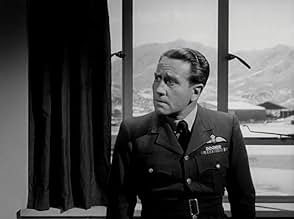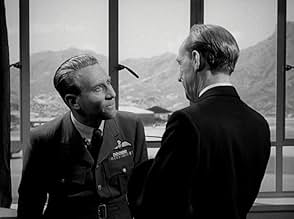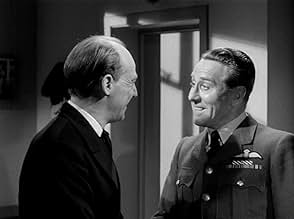PUNTUACIÓN EN IMDb
7,0/10
1,7 mil
TU PUNTUACIÓN
Añade un argumento en tu idiomaOn a routine flight from Hong Kong to Japan, a British military transport aircraft's fate may or may not depend on a prophetic nightmare.On a routine flight from Hong Kong to Japan, a British military transport aircraft's fate may or may not depend on a prophetic nightmare.On a routine flight from Hong Kong to Japan, a British military transport aircraft's fate may or may not depend on a prophetic nightmare.
- Dirección
- Guión
- Reparto principal
- Nominado a 4 premios BAFTA
- 4 nominaciones en total
Reseñas destacadas
Commander Michael Hordern has a detailed dream of 8 people in a plane crash which he relays to a group of travellers....due to fly the next day.
Interesting notion around whether destiny is preordained. A fine British cast deliver quite a theatrical piece with Redgrave, Knox and Elliott on fine form throughout this will they won't they fulfill the dream
Interesting notion around whether destiny is preordained. A fine British cast deliver quite a theatrical piece with Redgrave, Knox and Elliott on fine form throughout this will they won't they fulfill the dream
A 1950's movie from the British studios. The basis of the plot is relatively simple, however, the outcome is never really obvious. It may not keep you on the edge of your seat biting your nails but it does keep you guessing till the end. A few lines at the very end by two of the lesser characters adds a finish not really seen till the advent of the "Twighlight Zone" TV series. Shakespeare used the use of dreams in many of his plays. This created his characters thoughts and actions. It seems that this method is used in this film for the same reason and pushes the movie along. The movie has a classic British cast such as Michael Redgrave and Denholm Elliott. Whilst the other actors names might not be easily recalled. They are readily identifiable and seen in numerous British movies of the 1940's and 50's. There is a small amount comic relief in the movie through the minor characters of two British soldiers. Australian viewers may even find hard to recognize one of them as being the local classic actor Bill Kerr. It is an old fashioned movie worthy of a watch.
On display is one of the greatest scenarios ever presented in film - a flight over the Orient of which an anonymous British officer has had a dream premonition of disaster. What is so great about this idea and how it was executed here is that the dream itself is simply a catalyst for a psychological probing of the behavior of the passengers once they learn one-by-one about the particulars of the dream and how these particulars are playing out in their real flight. The theme then becomes the old-as-Shakespeare literary idea of fate vs. free will, but the strength of the filmmakers is that it is never resolved conclusively in the end. Even when the characters do hint at not letting a particular passenger on board the plane because this passenger has been prophesized to be an integral part of the disaster, they take no serious action to remove him, instinctively realizing that even that may not give them greater control over the situation.
The contrast of a modern technological artifice such as an aircraft with an archaic-style premonition is so brilliant because it portrays the ultimate paradox of human technological evolution: the farther human beings advance in their technological feats of control, paradoxically, the greater their lives are placed in the hands of the gods (fate) with all the many ways in which that technology can go tragically awry. For a simple idea, the filmmakers were obviously thinking, and they have added multiple layers to the story. "Night My Number Came Up" is a film I hope to see many times to pick up some themes I missed the first time. Like paintings, writing, and other forms of art, I believe that it is this characteristic which distinguishes great art from all the rest.
The contrast of a modern technological artifice such as an aircraft with an archaic-style premonition is so brilliant because it portrays the ultimate paradox of human technological evolution: the farther human beings advance in their technological feats of control, paradoxically, the greater their lives are placed in the hands of the gods (fate) with all the many ways in which that technology can go tragically awry. For a simple idea, the filmmakers were obviously thinking, and they have added multiple layers to the story. "Night My Number Came Up" is a film I hope to see many times to pick up some themes I missed the first time. Like paintings, writing, and other forms of art, I believe that it is this characteristic which distinguishes great art from all the rest.
Leslie Halliwell in his book HALLIWELL'S HARVEST refers to this as a "smoking room story", which is the kind of reminiscence tale told between old friends in a club over drinks. It is not given in one shot - all good anecdotes are told slowly and build up. This one (apparently based on a true incident from the Far East in the late 1940s) takes it's time, but as it progresses the momentum of events squeeze and squeeze the human personnel involved until the moment of crisis.
Do you believe in fate? It is an issue that has perplexed man since we first began to reason. Are our destinies written out in the stars of astrology, or in the hands of the three Greek "Fates" who spin, measure, and cut our threads? Or is everything done by chance, pure and simple? Years ago I read a portion of an essay by William James (I think it was him) for a philosophy course. James dismissed fate - he felt that the problem with believing in it is that if you decide to go down street A to reach point D a fatalist will say that you were always supposed to do that. But if you go down Street B to reach point D the fatalist would say the same thing, and that didn't sit well with James. But a fatalist would probably point out that as you went on that occasion only by one of those routes, that is the destined route you had to take at that occasion. So who can really know? In THE NIGHT MY NUMBER CAME UP, Michael Redgrave is a British Air Marshall who must go on a mission with several others, including Denholm Elliot and Alexander Knox in one of the military Dakotas used in World War II. There would be nothing wrong about this, but Michael Hordern who is in charge of arranging the trip has just had a nightmare wherein Redgrave, Elliot, Knox, and several others are traveling to the location of this mission (which Hordern did not know about when he went to bed that night) in a Dakota that is in mechanical difficulties and in very bad weather. In fact, it is crashing on a beach.
Hordern makes the mistake of telling this to the three of them, and while Redgrave pooh-poohs it, Elliot and Knox are not as certain (although Knox pretends it is all nonsense). Among other things, a major political figure (Ralph Truman) is supposed to be on the plane too in the dream, and he is not scheduled to attend the mission that Redgrave is going on. So the preparations go ahead. But point by point, little things from the dream begin to fall into place in the real world. For example, at a stopover, Truman suddenly shows up - he has to go by the Dakota on a separate trip, hooking up to another flight later on. Also there are a certain number of passengers, including a noisy one, who are to be on the plane. Everyone is happy when the number of passengers goes down, but it goes up as well. Then a rather noisy, boisterous businessman (George Rose, naturally), comes on board - literally manipulating his way on board when initially kept off by Elliot and Knox (he circumvents them going to Redgrave and Truman).
So the circumstances grow in the small world of that pressurized cabin as the passengers watch amazed at how good weather collapses and engine problems multiply (they can't raise the plane above a certain level outside the storm due to a pressurization problem - ironically enough). But Redgrave maintains his icy calm throughout the situation - he is determined that he and the others are not going to give into panic over the paranormal.
The film is excellent in tackling this type of situation in a serious way. In the end it does not matter if you are a fatalist or not, the film will carry you to to it's conclusion successfully.
One final minor point. I don't know much about the scrap metal business, but this film (made in 1955) and the Judy Holliday movie BORN YESTERDAY (1950) and one classic sequence in THE BEST YEARS OF OUR LIVES (1946) with Dana Andrews and the scrapped fleet of bombers are the only ones that seem to tackle this growing big business. A lot of military hardware was there for the taking after 1945. In BORN YESTERDAY, Harry (Broderick Crawford) owns junk yards and has built a local empire on scrap metal (and is in Washington to try to get the laws altered to expand his business). Here, George Rose (an English counterpart to Harry) is trying to get on the flight in order to get to Japan for an important conference dealing with British scrap metal interests in the Far East (and he constantly mentions the American competition as intense - a nod to Crawford?). It's almost enough to start a college study into the post war scrap metal business!
Do you believe in fate? It is an issue that has perplexed man since we first began to reason. Are our destinies written out in the stars of astrology, or in the hands of the three Greek "Fates" who spin, measure, and cut our threads? Or is everything done by chance, pure and simple? Years ago I read a portion of an essay by William James (I think it was him) for a philosophy course. James dismissed fate - he felt that the problem with believing in it is that if you decide to go down street A to reach point D a fatalist will say that you were always supposed to do that. But if you go down Street B to reach point D the fatalist would say the same thing, and that didn't sit well with James. But a fatalist would probably point out that as you went on that occasion only by one of those routes, that is the destined route you had to take at that occasion. So who can really know? In THE NIGHT MY NUMBER CAME UP, Michael Redgrave is a British Air Marshall who must go on a mission with several others, including Denholm Elliot and Alexander Knox in one of the military Dakotas used in World War II. There would be nothing wrong about this, but Michael Hordern who is in charge of arranging the trip has just had a nightmare wherein Redgrave, Elliot, Knox, and several others are traveling to the location of this mission (which Hordern did not know about when he went to bed that night) in a Dakota that is in mechanical difficulties and in very bad weather. In fact, it is crashing on a beach.
Hordern makes the mistake of telling this to the three of them, and while Redgrave pooh-poohs it, Elliot and Knox are not as certain (although Knox pretends it is all nonsense). Among other things, a major political figure (Ralph Truman) is supposed to be on the plane too in the dream, and he is not scheduled to attend the mission that Redgrave is going on. So the preparations go ahead. But point by point, little things from the dream begin to fall into place in the real world. For example, at a stopover, Truman suddenly shows up - he has to go by the Dakota on a separate trip, hooking up to another flight later on. Also there are a certain number of passengers, including a noisy one, who are to be on the plane. Everyone is happy when the number of passengers goes down, but it goes up as well. Then a rather noisy, boisterous businessman (George Rose, naturally), comes on board - literally manipulating his way on board when initially kept off by Elliot and Knox (he circumvents them going to Redgrave and Truman).
So the circumstances grow in the small world of that pressurized cabin as the passengers watch amazed at how good weather collapses and engine problems multiply (they can't raise the plane above a certain level outside the storm due to a pressurization problem - ironically enough). But Redgrave maintains his icy calm throughout the situation - he is determined that he and the others are not going to give into panic over the paranormal.
The film is excellent in tackling this type of situation in a serious way. In the end it does not matter if you are a fatalist or not, the film will carry you to to it's conclusion successfully.
One final minor point. I don't know much about the scrap metal business, but this film (made in 1955) and the Judy Holliday movie BORN YESTERDAY (1950) and one classic sequence in THE BEST YEARS OF OUR LIVES (1946) with Dana Andrews and the scrapped fleet of bombers are the only ones that seem to tackle this growing big business. A lot of military hardware was there for the taking after 1945. In BORN YESTERDAY, Harry (Broderick Crawford) owns junk yards and has built a local empire on scrap metal (and is in Washington to try to get the laws altered to expand his business). Here, George Rose (an English counterpart to Harry) is trying to get on the flight in order to get to Japan for an important conference dealing with British scrap metal interests in the Far East (and he constantly mentions the American competition as intense - a nod to Crawford?). It's almost enough to start a college study into the post war scrap metal business!
The seediness of the post-war colonial Far East and that rather morbid fascination with death and fate that pervades the consciousness of people who have been through a world-shattering conflict flavours this film. A great script (by RC Sherriff of 'Journeys End' fame) and a great cast - headed by that master of actorly understatement, Micheal Redgrave - slowly build the story, bit by bit. The exotic setting, where strange things could happen. The drab ordinariness of military outposts - which hightens the surreality of the events. A sense of a military and aristocratic world giving way with poor grace to the brash 'modern' future - epitomised by the crass Brummagem scrap dealer (accompanied by his effete elderly public-school personal assistant). The sense of dread is created by the pure spoken word and performance - of a good tale well-told. MR James in the age of Dakotas.
¿Sabías que...?
- CuriosidadesThe script is based on a personal account by Sir Victor Goddard.
- PifiasClearly, different cockpits were used in different shots. The altimeter keeps switching back and forth between two quite different designs and layouts.
- Citas
Mary Campbell: Anyone with sense has doubts.
- Créditos adicionalesOpening credits, prior to film title: There were 8 passengers 5 crew
Selecciones populares
Inicia sesión para calificar y añadir a tu lista para recibir recomendaciones personalizadas
- How long is The Night My Number Came Up?Con tecnología de Alexa
Detalles
- Fecha de lanzamiento
- País de origen
- Idioma
- Títulos en diferentes países
- Sie waren 13
- Localizaciones del rodaje
- Ealing Studios, Ealing, Londres, Inglaterra, Reino Unido(studio: made at)
- Empresas productoras
- Ver más compañías en los créditos en IMDbPro
- Duración
- 1h 34min(94 min)
- Color
- Relación de aspecto
- 1.33 : 1
- 1.85 : 1(originally intended theatrical ratio)
Contribuir a esta página
Sugerir un cambio o añadir el contenido que falta


































